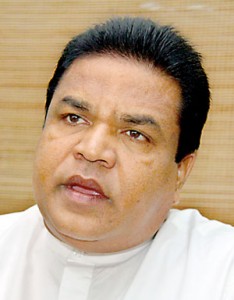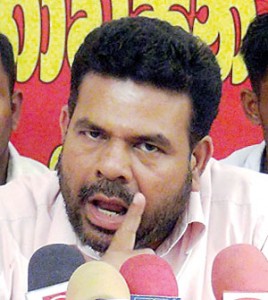News
Few mighty millers accused of rigging rice market

Rice market: Charges and counter charges
Farmer groups and small-scale paddy millers are accusing heavyweights of manipulating the rice market.
They say large-scale millers are gaining control by buying up stocks released by the Government. Brokers are buying paddy from Government stores on behalf of large-scale operators, while some are using fraudulent documents to claim they are small-scale millers.
All-Island Farmers Federation, national organizer, Namal Karunaratne, said large-scale millers had been stocking paddy to capitalise on shortages.
He predicts rice prices to drop and farmers to suffer as a result. While the Government claims that by importing rice it will deter rice millers from stocking up paddy, demand will drop and farmers will not benefit, he said.
He alleged that the decision to import rice was motivated by commission payments.
Karunaratne believes people are averse to imported rice and that large-scale millers will be able to sell rice at higher prices.
“Even though the farmer is paid Rs 38 per kilo at Government stores, the price of rice has risen to Rs 90 a kilo. However, if the Government sells to small-scale millers, they can sell at Rs 80,” he said.
He also cited an occasion in 2014, when when 300,000 metric tonnes of paddy were imported by the then Government and which rotted in storage.
A paddy mill owner as well as president of the Rice Producers’ Association, Mudith Perera, said that for 23 three years the price of rice had been determined by large-scale rice millers.
He said that every year, three of the large-scale mill owners buy up at least 30 percent of the Government stock to manipulate prices.
He alleged that the Paddy Marketing Board awarded import tenders to the highest bidder and handed paddy to 134 registered millers.
“The registered millers have good relations with the large-scale millers and the politicians. So they had paddy, but we are ignored,’’ he said.
Polonnaruwa rice miller, R.M.M.A.B Rajapaksha, said he did not receive stock. In previous years, to, he missed out despite being registered, and so he did not register again. He was forced to buy paddy from a middleman seller at Rs 57 a kilo.
“If the Government is importing rice, they are helping the large-scale millers who will buy that stock because the people will not be encouraged to buy foreign food even if it is cheap,’’ he argued.

P. Harison
He said imported rice will not be fit for consumption because it will be tainted.
However, the chairman of the Paddy Marketing Board, M B Dissanayake, rejected accusation saying paddy had been provided to all small and medium-sized mills.
But he said large-scale operators can not be prevented from buying through brokers.
The Minister of Rural Economic Affairs, P. Harrison, confirmed that tenders have been called to buy rice from suppliers from countries including India, Bangladesh, and Pakistan. The closing date and price has not been finalised.
Harrison said rice varieties such as Keeri Samba and Ponni Samba are likely to be imported.
Imports will force large-scale private millers to release the stocks they are holding, he claimed.
“We plan to distribute rice at a controlled price to encourage millers to provide rice at lower prices.’’
Harrison admits that large-scale millers have stocked up through brokers and small-scale millers.
He said a special economic committee that includes the president’s secretary, Agriculture Ministry secretary, Rural Affairs Ministry secretary and the PMB secretary have decided to first release half of the amount to large-scale millers, while others will get the remainder.
Out of 300 registered rice millers, paddy had been handed to only 267. The paddy had been provided to the highest bidder, he said.
He also challenged large scale-paddy miller Dudley Sirisena who claimed that officials at the ministry and the PMB are taking bribes, to complain to the anti-graft commission.
When contacted, Dudley Sirisena, said he did not want to comment until next week.

Namal Karunaratne

